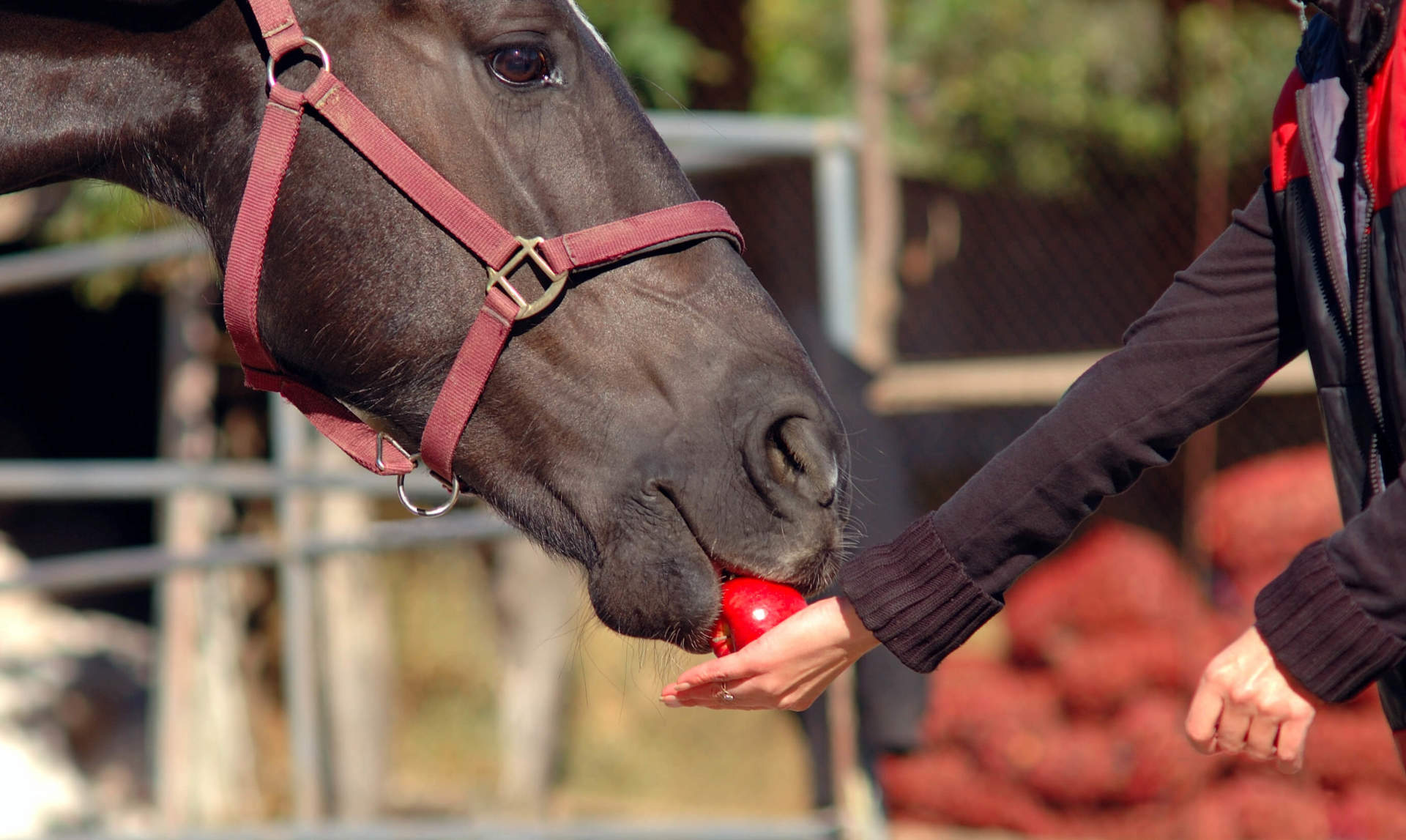The Crunchy Truth: Can Horses Eat Apples?
The Sweet and Nutritious Snack or Risky Treat? Your Definitive Guide to Feeding Apples to Horses

Apples and horses have been intertwined for centuries. Did you know apple giving is rooted in ancient traditions? Back in the old days, apples were given as special gifts to prize horses.
Today, apples remain a beloved treat for our equine companions. But can horses eat apples safely and how much should they have? Let’s explore the benefits, nutrition facts, and best feeding practices for apples and horses.
Can Horses Eat Apples?
The short answer is yes, horses can eat apples in moderation as part of a balanced diet. Apples offer key vitamins, minerals, and antioxidants horses need.
Many owners offer sliced apples as the occasional snack or reward. Just be sure to introduce new treats slowly and watch for any digestive issues.
As veterinary guidelines from the AAEP explain, the key is feeding apples in appropriate amounts. An apple a day won’t hurt, but more than that may be problematic.
Benefits of Apples for Horses
What makes apples a healthy choice for horses? Here are some of the main benefits:
- High in vitamin C, A, and antioxidants. Apples contain beneficial phytonutrients like quercetin.
- Provide energy. The natural sugar fuels horses without excess starches.
- Promote digestion. The fiber and water content aid digestion.
- Low in sugar and starch. Compared to other fruits, apples are lower on the glycemic index.
- Crunchy texture. Great for dental health as horses chew.
Types of Apples for Horses
Stick to sweet, fleshy apple varieties when choosing treats for your horse. Some top picks include:
- Red Delicious – Classic bright red apples with a mildly sweet flavor.
- Fuji – Sweet and crisp lighter yellow-green apples.
- Gala – Distinctive pinkish-red striped apples with a honey flavor.
- Granny Smith – Tart green apples that soften when ripe.
Avoid tiny crabapples which can be too tart or sour. And remember to thoroughly wash apples to remove any pesticide residue from the skin.
How Many Apples for a Horse?
When it comes to apples, moderation is key. But how many apples can horses eat safely? General guidelines recommend:
- 1 to 2 small apples per day at most.
- Slice apples into smaller pieces to limit portions.
- Adjust serving size based on your horse’s weight.
- Spread out apple treats over week rather than daily.
The UC Davis Veterinary Medicine guidelines note the average 1,000-pound horse could have 2 lbs. of apple slices weekly. But consult your vet on the ideal amount for your horse’s diet. Too many apples and they may get an upset stomach or diarrhea.
Nutritional Value of Apples for Horses
What exactly makes apples nutritious for horses? Here’s an overview of the main vitamins, minerals, and nutrients found in apples:
- Vitamin C – Apples have antioxidant effects and support immune health.
- Vitamin A – Important for vision, bone growth, and coat health.
- Calcium – Needed for strong bones, nerves, muscles.
- Phosphorus – Works with calcium for bone formation.
- Antioxidants like quercetin – Reduce inflammation and cell damage.
Apples are also high in fiber from pectin while being low in fat, sugar, and calories. This makes them a healthy supplemental treat.
Best Ways to Feed Apples to Horses
Simply handing an entire apple to your horse is not the best idea. Here are some tips for serving apples safely:
- Slice into pieces – Much easier to chew than a whole apple.
- Core apples first – Removes dangerous seeds and stem.
- Mash into oatmeal – Mix with their regular feed.
- Combine with other treats – Carrots, hay pellets, horse cookies.
- Use as training rewards – Positive reinforcement for learned behaviors.
The key is slowing down consumption and allowing horses to fully enjoy the flavors. The Spruce Pets recommends slicing apples into 1/8th inch pieces for easy chewing.
Precautions When Feeding Apples
While apples are safe for most horses, take these precautions:
- Wash thoroughly – Remove pesticide and bacteria residue.
- Check for mold – Toss out any damaged parts.
- Introduce slowly – Start with a few slices to check for tolerance.
- Don’t leave uneaten – Pick up leftovers to avoid rotting.
It’s also smart to hold off on new foods if your horse is stressed or ill as their digestive system will be more sensitive.
Apples vs. Apple Treats
When considering apple treats, fresh apple slices are healthier than processed apple snacks. Prepared apple treats often contain added:
- Sugars – To make them tastier.
- Salt and molasses – To extend shelf life.
- Preservatives – To maintain texture.
- Fillers like corn or soy – To cut costs.
Check the ingredients list and calorie count before choosing treats. And remember treats should not replace hay and feed which offer balanced daily nutrition.
Potential Risks of Feeding Apples to Horses:
While apples make a nutritious occasional treat, overdoing it can cause problems. Here are some potential risks horse owners should be aware of:
- Choking hazard – Whole apples can obstruct the esophagus. Always slice apples into bite-size pieces first.
- Digestive issues – Too many apples may cause diarrhea or colic due to the high fiber and water content.
- Pesticides – Be sure to wash apple skin thoroughly before feeding to remove any chemical residue.
- High glycemic response – Some sweet apple varieties have more sugar which can cause blood sugar spikes. opt for low-glycemic options like Granny Smith.
Moderation is key when incorporating apples into your horse’s diet. Consult your vet on the ideal serving size and frequency to avoid adverse reactions.
Signs Your Horse Ate Too Many Apples
If your horse overindulges on apples, watch for these symptoms:
- Diarrhea or loose stools – Due to the laxative effect of too much fiber.
- Decreased appetite – Fullness from excess fruit.
- Visible apple pieces in manure – Indicates poor digestion.
- Rolling, lying down, or pacing – Signs of colic pain.
Should you notice any of these, remove apples and call your vet. They may recommend probiotics, electrolytes, or other supplements to get your horse’s digestive system back on track.
Healthy Apple Treat Alternatives
If your horse doesn’t tolerate apples well, consider these other healthy treats:
- Carrots – Similar chewing benefits and vitamin A.
- Bananas – Excellent source of potassium and magnesium.
- Watermelon – Hydrating, digestible, with vitamin C.
- Horse treats – Look for all-natural ingredients with added vitamins.
Proper Storage and Preparation
Follow these steps for safely storing and serving apples to horses:
- Store refrigerated – Keeps fresh for 2-3 weeks.
- Check for bruises – Cut out any damaged sections.
- Wash thoroughly – Reduce bacteria and chemicals.
- Slice into pieces – Easier to chew and digest.
- Core apples – Remove hazardous seeds and stem.
- Mash for senior horses – Softer texture if needed.
With proper portion sizes and preparation, apples can be a nutritious, natural treat horse owners can feel good about feeding. Just be cautious with amounts and watch for any adverse reactions.
Moderation and variety are key when supplementing your horse’s balanced diet.



